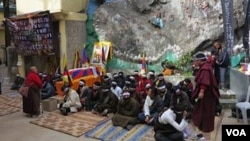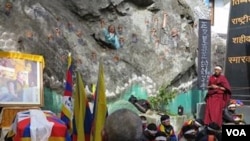DHARAMSALA, INDIA —
In the seat of the Tibetan exile government in northern India, this year's festivities for New Year - or Losar - are muted. Leaders are calling for the toned-down celebrations as the number of Tibetan self-immolations nears 100, and Chinese authorities carry out mass arrests of Tibetans for allegedly supporting self-immolation as a form of protest against Beijing’s rule.
Lobsang Sangay, political head of the government-in-exile, says this New Year is a time for reflection. “I ask Tibetans all over the world, including inside Tibet, not to celebrate Tibetan New Year in solidarity with 99 Tibetans who have self-immolated and in condolences to the 83 Tibetans who have died; all those Tibetans who are in prison, and Tibetans inside Tibet who are being repressed,” Sangay said.
Speaking with VOA, Lobsang Sangay says that instead of celebrating the New Year, Tibetans both inside and outside China should assert their identity. “On February 11th, on our New Year’s Day, we will not have festivities. Rather, what we will have is Tibetans wearing traditional dress, going to monastery or Buddhist centers, and praying for all those who have died or continue to suffer inside Tibet,” explained Sangay.
New Year is the one time when increasingly dislocated Tibetan families strive to reunite, says Pema Choedon of the Tibetan Women’s Association. This is the case whether they live inside China-controlled Tibet - where freedom of movement is often restricted at a time of year considered sensitive by Chinese authorities - or in the sprawling Diaspora.
“Normally, this is the biggest festival in Tibetan tradition," said Choedon. "Normally. It is a sign of solidarity that people are not celebrating.”
In the narrow streets of Dharamsala on New Year’s Day, Tibetans have followed Sangay’s request. Monks and nuns are dressed, as ever, in their burgundy robes. The majority of other Tibetans are dressed in traditional long coats called chubas. On Monday, they jostle for space with tourists and visitors also heading to the Dalai Lama’s temple to pray.
The atmosphere might be noticeably more somber this year. But the world should not make the mistake of thinking Tibetans - particularly Tibetan youths - feel any less strongly about their desire for increased autonomy, says Tashi Pasang, a refugee who runs the popular Mandala Café.
“Born as a Tibetan, you have extra responsibility. If you go back 100 years, Tibet was way too isolated. We did not have knowledge about the world. Now our youngsters are very aware. They know social networks, and are ready to challenge any situation. Not just politics - education, anything. There is a big hope that one day we will go back," Pasang noted. "This is our time now.”
The Tibetan exile government known as the Central Tibetan Administration has repeatedly urged Tibetans not to resort to self immolations in protests against Chinese rule.
But Beijing routinely accuses the Dalai Lama and others in exile of inciting the wave of self-immolations inside Tibetan areas of China that have drawn international attention in the past three years. To stop the high-profile suicides, China recently has arrested more than 70 Tibetans on charges of assisting others to set themselves alight. Most arrests have occurred in the western Qinghai province.
Chinese state-backed media also recently accused U.S.-funded broadcasters, including the Voice of America, of encouraging Tibetans to self-immolate. VOA's director has called the allegations “absurd.”
Many in Dharamsala expect a further tightening of security in Tibetan areas of China in the coming weeks, as authorities try to head off protests marking the anniversaries of previous Tibetan uprisings in 1959 (March 10) and 2008 (March 14).
Lobsang Sangay, political head of the government-in-exile, says this New Year is a time for reflection. “I ask Tibetans all over the world, including inside Tibet, not to celebrate Tibetan New Year in solidarity with 99 Tibetans who have self-immolated and in condolences to the 83 Tibetans who have died; all those Tibetans who are in prison, and Tibetans inside Tibet who are being repressed,” Sangay said.
Speaking with VOA, Lobsang Sangay says that instead of celebrating the New Year, Tibetans both inside and outside China should assert their identity. “On February 11th, on our New Year’s Day, we will not have festivities. Rather, what we will have is Tibetans wearing traditional dress, going to monastery or Buddhist centers, and praying for all those who have died or continue to suffer inside Tibet,” explained Sangay.
New Year is the one time when increasingly dislocated Tibetan families strive to reunite, says Pema Choedon of the Tibetan Women’s Association. This is the case whether they live inside China-controlled Tibet - where freedom of movement is often restricted at a time of year considered sensitive by Chinese authorities - or in the sprawling Diaspora.
“Normally, this is the biggest festival in Tibetan tradition," said Choedon. "Normally. It is a sign of solidarity that people are not celebrating.”
In the narrow streets of Dharamsala on New Year’s Day, Tibetans have followed Sangay’s request. Monks and nuns are dressed, as ever, in their burgundy robes. The majority of other Tibetans are dressed in traditional long coats called chubas. On Monday, they jostle for space with tourists and visitors also heading to the Dalai Lama’s temple to pray.
The atmosphere might be noticeably more somber this year. But the world should not make the mistake of thinking Tibetans - particularly Tibetan youths - feel any less strongly about their desire for increased autonomy, says Tashi Pasang, a refugee who runs the popular Mandala Café.
“Born as a Tibetan, you have extra responsibility. If you go back 100 years, Tibet was way too isolated. We did not have knowledge about the world. Now our youngsters are very aware. They know social networks, and are ready to challenge any situation. Not just politics - education, anything. There is a big hope that one day we will go back," Pasang noted. "This is our time now.”
The Tibetan exile government known as the Central Tibetan Administration has repeatedly urged Tibetans not to resort to self immolations in protests against Chinese rule.
But Beijing routinely accuses the Dalai Lama and others in exile of inciting the wave of self-immolations inside Tibetan areas of China that have drawn international attention in the past three years. To stop the high-profile suicides, China recently has arrested more than 70 Tibetans on charges of assisting others to set themselves alight. Most arrests have occurred in the western Qinghai province.
Chinese state-backed media also recently accused U.S.-funded broadcasters, including the Voice of America, of encouraging Tibetans to self-immolate. VOA's director has called the allegations “absurd.”
Many in Dharamsala expect a further tightening of security in Tibetan areas of China in the coming weeks, as authorities try to head off protests marking the anniversaries of previous Tibetan uprisings in 1959 (March 10) and 2008 (March 14).





